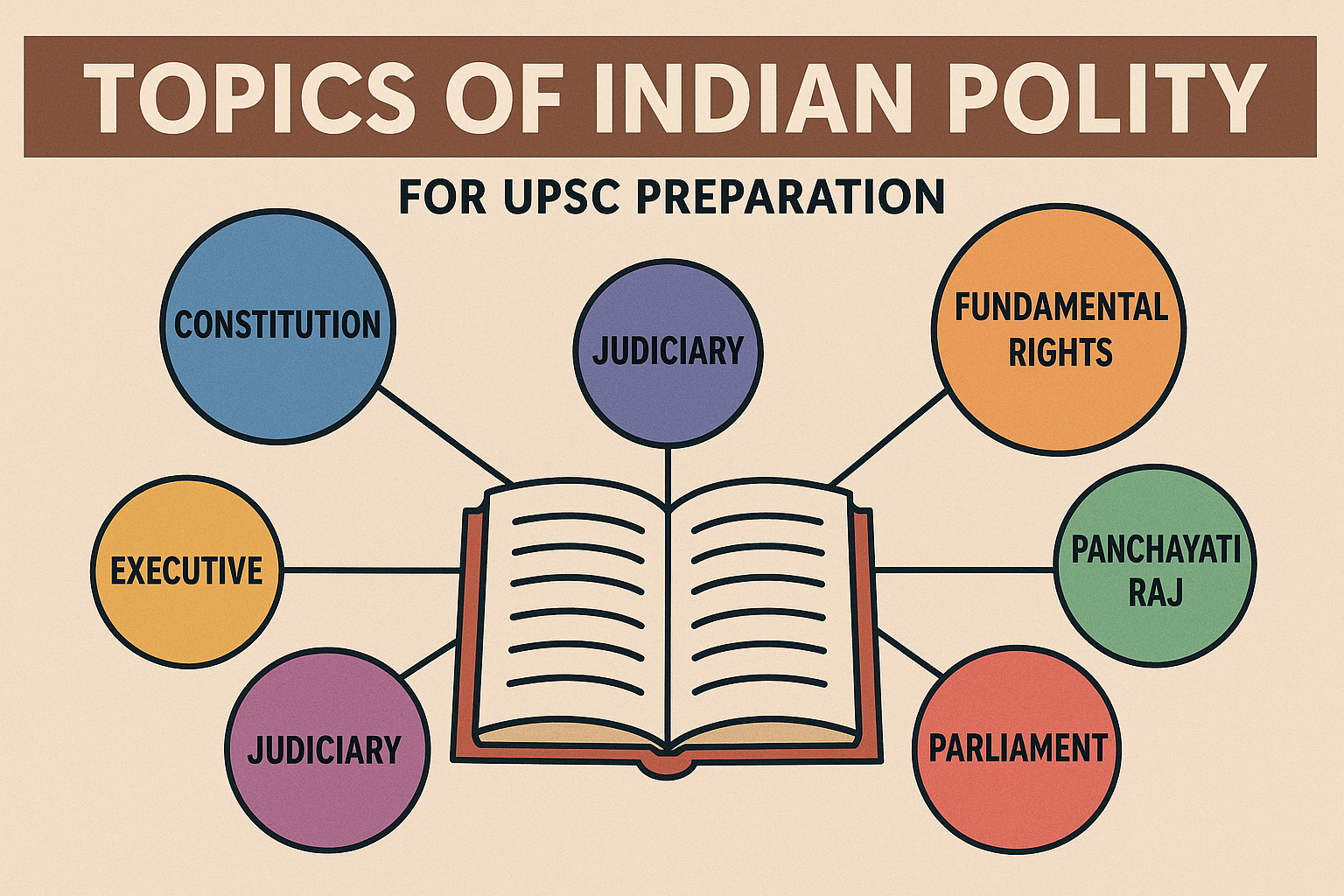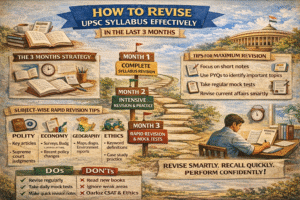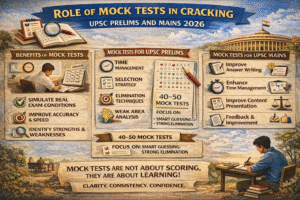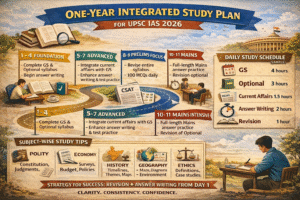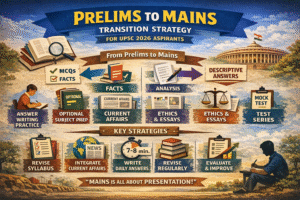Introduction
Indian Polity is one of the most important pillars of the UPSC Civil Services Examination. Every year, a significant number of questions are asked in the Prelims and Mains, making it a high-scoring subject if prepared strategically. The subject not only helps in answering direct polity questions but also strengthens a candidate’s understanding of governance, current affairs, and the functioning of India’s constitutional framework.
Below is a comprehensive guide to the important topics of Indian Polity for UPSC preparation:
1. Constitution of India
- Historical background of the Indian Constitution
- Making of the Constitution and Constituent Assembly
- Salient features of the Constitution
- Preamble and its significance
- Schedules and Amendments
2. Fundamental Rights, Duties, and Directive Principles
- Fundamental Rights – scope, exceptions, and landmark judgments
- Fundamental Duties and their relevance
- Directive Principles of State Policy (DPSPs) – classification and importance
3. Union and its Territory
- States and Union Territories
- Citizenship – provisions, amendments, and recent developments (CAA, NRC debates)
4. System of Government
- Parliamentary vs Presidential system
- Federal vs Unitary features
- Cooperative and Competitive Federalism
5. Union Government
- Executive: President, Vice-President, Prime Minister, Council of Ministers
- Parliament: Structure, powers, privileges, and procedures
- Judiciary: Supreme Court, High Courts, Judicial review, Judicial activism, PILs
6. State Government
- Governor, Chief Minister, and State Council of Ministers
- State Legislature – powers, privileges, and limitations
- State High Courts and Subordinate Courts
7. Local Government
- Panchayati Raj Institutions (73rd Amendment)
- Municipalities (74th Amendment)
- Functions, finances, and challenges of local bodies
8. Constitutional and Non-Constitutional Bodies
- Constitutional Bodies: Election Commission, CAG, UPSC, Finance Commission, etc.
- Non-Constitutional Bodies: NITI Aayog, NHRC, CBI, Lokpal, etc.
9. Emergency Provisions
- Types of emergencies – National, State, and Financial
- Impact on Fundamental Rights
- Criticism and misuse of emergency powers
10. Amendments and Landmark Judgments
- Important amendments (42nd, 44th, 73rd, 74th, 101st, etc.)
- Landmark Supreme Court judgments: Kesavananda Bharati, Indira Sawhney, S.R. Bommai, etc.
11. Other Important Areas
- Special provisions for certain states (Articles 370, 371, etc.)
- Tribunals and Special Courts
- Official Language provisions
- Cooperative societies and their constitutional status
Why Indian Polity is Crucial for UPSC?
- Prelims: Direct factual and analytical questions are common.
- Mains (GS Paper II): Polity forms the backbone of Governance and Constitution-related questions.
- Interview: A good grasp of polity helps in answering governance-related questions confidently.
Preparation Tips for Indian Polity
- Start with NCERT Class IX–XII Polity books for basics.
- Study M. Laxmikanth’s Indian Polity as the core reference.
- Relate static topics with current affairs (e.g., Supreme Court judgments, new amendments, ordinances).
- Practice previous years’ UPSC questions to understand the pattern.
How Victor Growth Helps in Indian Polity Preparation
At Victor Growth, we provide a structured strategy for mastering Indian Polity. Our expert faculty break down complex constitutional provisions into simple explanations, connect static syllabus with current affairs, and ensure aspirants develop conceptual clarity. With specialized classes, test series, and mentorship, Victor Growth ensures that UPSC aspirants can approach Polity with confidence and score maximum marks.
FAQs on Indian Polity for UPSC Preparation
Q1. Which book is best for Indian Polity for UPSC?
M. Laxmikanth’s Indian Polity is the most recommended book, along with NCERTs and current affairs sources.
Q2. How many questions are asked from Polity in UPSC Prelims?
On average, 12–15 questions come directly from Indian Polity in Prelims.
Q3. Is Polity only about memorization?
No. While facts are important, understanding the logic behind provisions and linking them with current issues is crucial.
Q4. How should I revise Polity before exams?
Use concise notes, flowcharts, and attempt multiple mock tests to reinforce memory.
Q5. Why choose Victor Growth for Polity preparation?
Victor Growth provides structured learning, updated material, and expert mentorship, helping aspirants master both static and dynamic aspects of Polity effectively.
Conclusion:
Indian Polity is a scoring and indispensable part of UPSC preparation. With the right study material, consistent practice, and expert guidance from platforms like Victor Growth, aspirants can master this subject and maximize their chances of success in UPSC.

